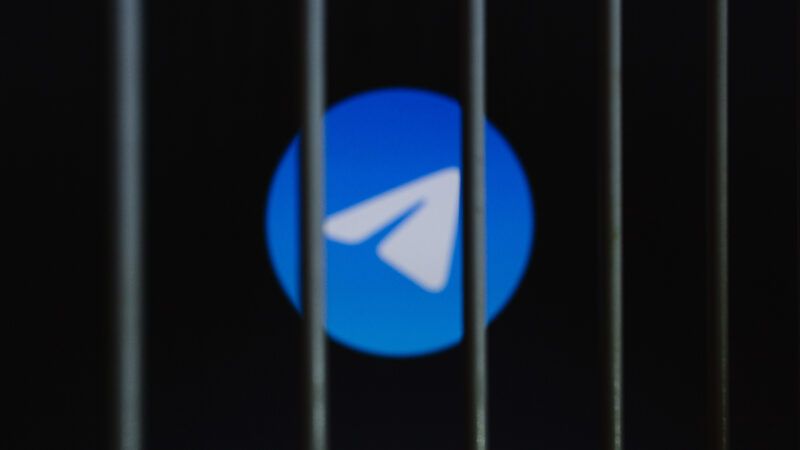Putin and the Ayatollah Wanted To Censor This App. Now It's Macron's Turn.
French police arrested Telegram founder Pavel Durov for failing to control his social media and messaging app.

Telegram is one of the last (mostly) uncensored frontiers of the internet. The messaging app allows users to message each other through both unencrypted and encrypted chats, and to create "channels" that other users can subscribe to. There's no feed with an algorithm to manipulate, and founder Pavel Durov has committed to never sharing user information with authorities.
That has made Durov a lot of enemies. A decade ago, Durov fled Russia after his previous social media company, VKontakte, was taken over by the government. (Since then, he spent most of his time in Dubai and obtained French citizenship in 2021.) Russia banned Durov's newer app Telegram in 2018 but then unblocked the app two years later. Countries like China and Iran have also banned Telegram.
Over the weekend, French authorities arrested Durov at the airport for complicity in fraud, drug trafficking, cyberbullying, organized crime, and promotion of terrorism. The French office in charge of combating crimes against children said that it had requested the arrest warrant for Telegram's "lack of moderation and cooperation" in the fight against "pedocriminality."
Durov's lawyer called it "absolutely ridiculous" to blame an app's founder for the behavior of users, comparing the arrest of Durov to "blaming a car manufacturer, some giant auto concern, for the fact that its cars are used for criminal purposes." Telegram said—in a statement on its official Telegram channel—that its "moderation is within industry standards" and that Durov has "nothing to hide."
The French case against Telegram resembles the U.S. case against Backpage, an online classified ad service that was shut down in 2018. Authorities insinuated that Backpage staff were failing to stop sex traffickers on the platform but never charged any of them with sex trafficking, instead convicting co-founder Michael Lacey with a single banking violation.
French President Emmanuel Macron denied that there was any "political decision" behind Durov's arrest. Inside Russia, however, members of both the opposition and the government saw Durov's arrest as an obvious attack on Telegram's independence. Human rights lawyer Dmitry Zair-Bek said that Europe "is declaring war not only on Telegram and its team but also freedom of speech and secrecy of correspondence as a whole."
Russian President Vladimir Putin "was a pioneer," Libertarian Party of Russia leader Mikhail Svetov stated sarcastically in an essay on Durov's arrest. "He set an example for the rest of the Western political class with his censorship, destruction of privacy, and surveillance. It turns out that the West was simply trailing behind."
Russia attempted to ban Telegram in 2018, then gave up and unblocked the app in 2020. Today, many government supporters in Russia use the app for their own propaganda. While the Russian government accused France of "double standards" around free speech for its targeting of Telegram, former President Dmitry Medvedev gloated that Durov had "miscalculated" by fleeing Russia.
"Once, a long time ago, I asked Durov why he wouldn't cooperate with [Russian] law enforcement to solve serious crimes," Medvedev said. "'This is my principled position,' he said. 'In that case, you'll face serious problems in any country,' I told him."
Durov's experience with Iran, however, may have taught him that cooperation with governments only invites more censorship. In December 2017, amid unrest in Iran, Telegram agreed to censor an Iranian opposition channel for encouraging protesters to use firebombs against the police. A few months later, the Iranian government banned Telegram anyway.
The very nature of the platform had made it hard for Iranian authorities to shut down all the dissident content on Telegram. Instead, the government has tried to push Iranians to use government-made and government-approved knockoff apps. The ban has been ineffective; even Iranian government propagandists themselves still use Telegram.
In April 2024, the Chinese government pushed Apple to remove WhatsApp, Threads, Signal, and Telegram from the Chinese version of the App Store. These apps were already blocked by Chinese internet service providers, but Chinese users had found ways around the Great Firewall. Durov claimed that the Apple ban did not affect Chinese use of Telegram, since users could still download the Android version directly.
"Chinese people are smart—they like Telegram and find a way to use it," Durov said.
Of course, America and France have important differences from Russia, China, and Iran. Along with civil rights laws, most Western countries have a large, independent tech sector wary of government interference. Silicon Valley billionaires David Sacks and Elon Musk both condemned Durov's arrest.
Still, even the American tech sector's independence has been weakening in the face of political pressure. Earlier this year, Congress passed a bill forcing Chinese company ByteDance to either sell off the social media app TikTok or face a ban from American app stores. Some opponents of the First Amendment are excited by the possibilities.
Former U.S. National Security Council official Alexander Vindman celebrated the defeat of "free speech absolutists weirdos" in a series of social media posts. Durov's arrest "has broader implications for other social media, including Twitter," Vindman wrote. "There's a growing intolerance for platforming disinfo & malign influence & a growing appetite for accountability. Musk should be nervous."


Show Comments (69)